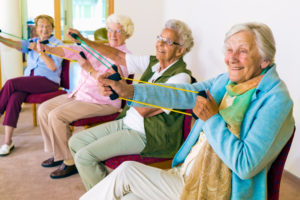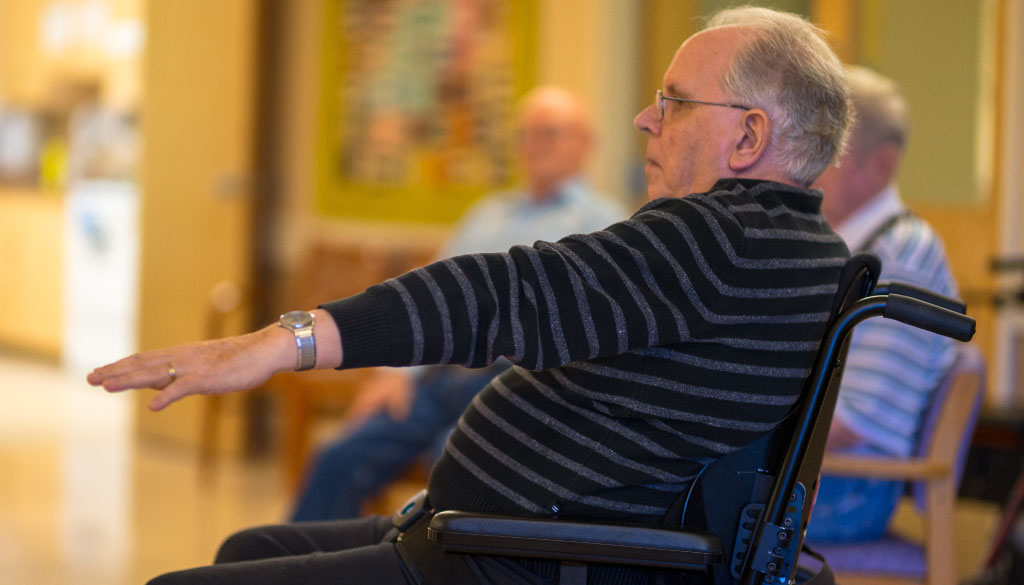By Michael Kary

The importance of recreational therapy programs for seniors has been highlighted in various recent reports, including those by the BC Office of the Seniors Advocate (OSA) and the BC Care Providers Association (BCCPA). Research studies also suggest that recreational therapy has an essential role in many areas, including enhancing the mobility of older adults in long-term care. A recent study from Norway, for example, highlights that that elderly people with dementia who have good balance, muscular strength and mobility are less likely to suffer from depression.[i] This is also the focus of a new report entitled Recreation Therapy to Promote Mobility Among Older Adults in Long Term Care released this week by the Canadian Association for Long Term Care (CALTC) – a national association which includes the BCCPA.
As outlined in a 2016 report by the OSA, recreational therapy is critical to ensuring seniors are engaged socially, an important determinant for both physical and mental wellbeing. The OSA report also notes that BC ranks below other provinces such as Alberta in the provision of recreational therapy with fewer seniors receiving such services in the past seven days (i.e. 24% for BC versus 33% for Alberta).[ii] While the latest 2018 OSA report found that recreational therapy rates in long term care have been increasing, with on average 29% of residents receiving these services between October to September (2016/17), BC still remains behind other provinces in the provision of recreational therapy to seniors.[iii]
While these increases are encouraging, the BCCPA, in conjunction with CALTC, believes more must be done to ensure seniors have access to life-enhancing therapies. In this regard, the BCCPA in its 2017 report entitled Strengthening Seniors Care: A Made-in-BC Road Map, recommended that the provincial government establish a new fund to support quality of life for seniors in long term care and in the community. Through the proposed Seniors Quality of Life Fund (SQLF), non-government operated care homes could apply for up to $100 per senior per month in funding that would directly improve quality of life for seniors in both their homes and in their communities. Integral to the SQLF and improving seniors’ quality of life is increasing access to life enhancing programs, including recreational therapy.[iv]
The BCCPA is committed to enhancing seniors’ quality of life and is working with several partners to further this cause. In addition to advocating for a SQLF, the BCCPA has partnered with Mitacs and Simon Fraser University (SFU), along with its counterparts in Ontario (Ontario Long Term Care Association) and Alberta (Alberta Continuing Care Association) to develop the paper being released this week by the CALTC entitled Recreation Therapy to Promote Mobility Among Older Adults in Long Term Care. This timely report provides an overview of the scientific evidence and current practices for recreational therapy in long term care, focusing largely on programs for improving or maintaining the mobility of older adults.[v]
The report also identifies some best practices as well as outlines many of the challenges and barriers to implementing recreational therapy programs in long term care. Limited space, inadequate staffing, and a lack of knowledge of the delivery of reactional therapy programs, for example, were commonly identified as barriers to the successful implementation of such programs. Several common themes also emerged from the report, including a lack of clarity about the range of programs currently offered and the effectiveness of these programs for older adults of different physical and cognitive status.[vi]

The report also provides greater clarity on the effectiveness and suitability of recreation therapy for a diverse long term care population and supports health providers in selecting suitable recreation therapy programs for the seniors in their care. Included in the report is also a summary of an extensive literature search on recreational therapy practices in long term care as well as a survey that went to care homes across Alberta, Ontario and British Columbia.
The BCCPA, in conjunction with CALTC, is confident that this report will be an important resource document for further work and study on recreational therapy in long term care. The report also highlights ten key findings (see table 1), including further study in the area of recreational therapy, such as:
- That future studies should develop a standardized definition of recreation therapy;
- Programs need to be aligned to the sense of purpose of older individuals to support engagement;
- Delivery of recreation therapy programs can be improved by tailoring the programs to residents’ interest, cognitive status, and motivation; and
- Implementation strategies should include the choice of evidence-based programs, modification of the program, instructor training, and identification of participants.
In addition to these key findings, the report also highlights that increasing resources, including staffing for recreational therapy programs, is integral to improving the overall quality of life for seniors. This aligns with other reports including one which notes that that life for seniors in long term care must be filled with more meaningful activities that can encourage involvement and participation as well as ensure residents get the opportunity to engage in physical activity through their everyday activities.[vii]
The BCCPA, in conjunction with CALTC, hopes this report will begin further discussions on the vital role recreational therapy, including physical activities, can have for seniors receiving care as well as why further resources and research studies are critical in this area.
|
Table 1: Recreation Therapy to Promote Mobility Among Older Adults in LTC Key Findings |
|
END NOTES
[i] Science Nordic. Elderly people with dementia need more physical activity. Sonja Balci. February 15, 2018.
[ii] BC Office of the Seniors Advocate. Making Progress Placement, Drugs and Therapy Update. November 2016.
[iii] BC Office of the Seniors Advocate. British Columbia Residential Care Facilities Quick Facts Directory Summary. 2018.
[iv] BCCPA. Strenghtening Seniors Care: A Made-In BC Road Map. January 2017.
[v] BCCPA et al. Recreation Therapy to Promote Mobility Among Older Adults in Long Term Care: Overview of Scientific Evidence and Current Practice.
[vi] BCCPA et al. Recreation Therapy to Promote Mobility Among Older Adults in Long Term Care: Overview of Scientific Evidence and Current Practice.
[vii] Science Nordic. Elderly people with dementia need more physical activity. Sonja Balci. February 15, 2018.




